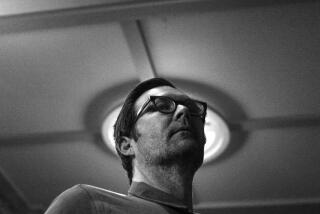AN APPRECIATION : Anthony Perkins . . . Profile in Private Courage
- Share via
Fame plays its own tricks, sometimes cruel. It has a way of singling out one achievement in a career, a seemingly welcome recognition, but at the expense of putting all the other achievements of the career in shadow, which is not kind.
Inevitably the obituaries for Anthony Perkins, who died Saturday of complications of AIDS at the age of 60, began by citing his undeniably haunting and unforgettable performance as Norman Bates, proprietor of the Bates Motel in succession to his beloved mother, in Alfred Hitchcock’s “Psycho.”
The extraordinary shower sequence in which he dispatches Janet Leigh never actually shows knife hitting flesh (thanks to Hitchcock’s ingenuity and some fast editing) but it remains as horrifying a scene as most of us ever saw. And his stabbing of Martin Balsam as he climbs the stairs is the more shocking because it is totally unexpected. If those honors belonged to the director, Perkins’ dazed soliloquy about not harming a fly, in the police station after he has been arrested, was his personal triumph, as scary in its demented innocence as the violence had been.
But that spectacular film came out 32 years ago, in 1960, and Perkins had done good work before it and was to do good work after it. Yet Norman Bates was to haunt him, as Bates continues to bring chills to those who encounter the film for the first time, in revivals or reruns.
Perkins had made an impressive debut at 21 in “The Actress,” opposite Jean Simmons, and won an Academy Award nomination for “Friendly Persuasion” with Gary Cooper in 1956. Despite the shadowing effect of “Psycho,” he compiled an admirable filmography, even if for several years he had to work in Europe to escape the identification with Bates.
Back in the United States he co-starred in “Pretty Poison,” not a hit in first release but now a cult classic. He can be remembered as well for Joan Didion’s “Play It as It Lays,” and for the stylish murder mystery, “The Last of Sheila,” which he co-wrote with Stephen Sondheim and which Herbert Ross directed.
Although Perkins could play comedy (“The Tall Story”) the camera is hard to deceive. And what it saw in Perkins was the tense, introspective, often unhappy and very private person he clearly was. As is often the case, Perkins’ strengths as an actor seemed to derive from the emotional stresses he had suffered from childhood forward (as he revealed in interviews in later years when marriage and parenthood had brought a degree of calm to his life).
Perkins, you had the feeling, revealed himself in the intensity of his most impressive roles, as a man who could identify with profound distress and even obsession, the unhappiness which lie almost beyond reach. What seems sadly clear in the statement he left as he died is that the disguises of acting were no blessings, and did not assuage the pains of a very troubled childhood nor a difficult search for tranquillity as an adult.
He had learned more about love and compassion after he found he had AIDS, Perkins said, than he had ever known in the acting life. And so it appears, you are tempted to say, that Perkins had played his best, most courageous and in a curious way most ennobling role in private, away from the limelight, far from the hard ambiguities of fame.
More to Read
Only good movies
Get the Indie Focus newsletter, Mark Olsen's weekly guide to the world of cinema.
You may occasionally receive promotional content from the Los Angeles Times.










